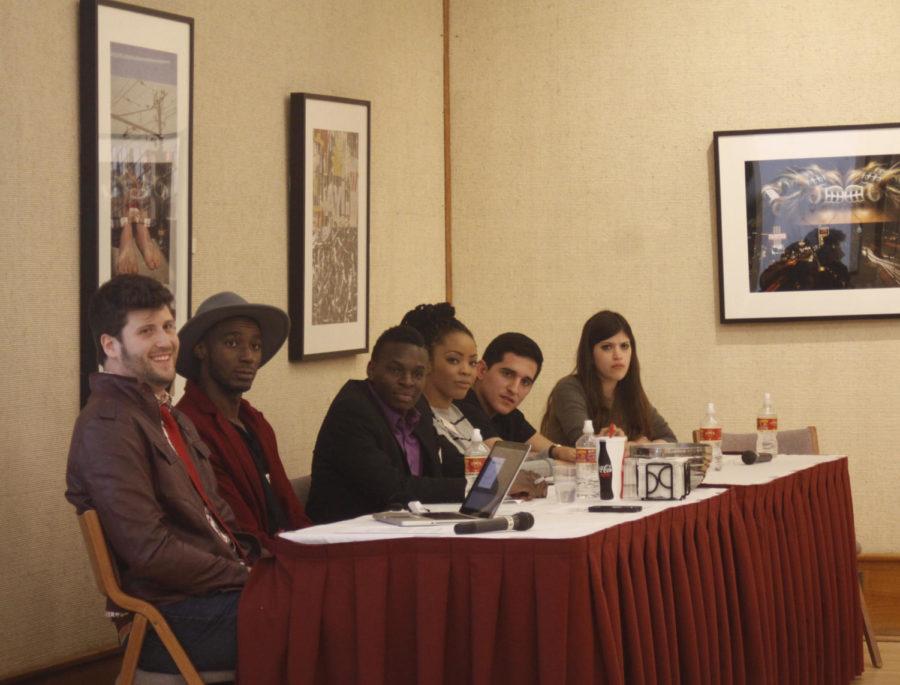Diversity project prompts discussion on diversity, inclusion
Kennedy DeRaedt/Iowa State Daily
Members of the Greenlee College talk about the college’s increase in enrollment during the “Inclusive and Uncommon Leadership: Subverting a Perfectly Acceptable Student Ambassador Program” session. The session was held at 3:10 in the Gallery Room at the Memorial Union. It took place on Mar. 4 during ISCORE.
January 17, 2017
For students interested in discussing multicultural topics and issues, the National Conference on Race and Ethnicity (NCORE) will host open applications until Friday.
The national conference will take place from May 30 to June 3 in Fort Worth, Texas. It is a precursor to the Iowa State Conference on Race and Ethnicity (ISCORE), which will happen March 3 in the Memorial Union.
“The [NCORE-ISCORE] Project has helped [Iowa State] by engaging the campus in conversations about race and ethnicity,” said Som Mongtin, the Brenda Jones NCORE-ISCORE Change Agent Award co-chair. “Diversity is a component that Iowa State continues to prioritize … but sometimes people don’t have the tools to really talk about or implement it.”
She said NCORE-ISCORE is one of the tools that does that.
For students who have the chance to participate, many recount the experience as life-changing.
“It was phenomenal. It really was,” said Kyle Perkins, a senior in psychology who was part of last year’s cohort. “It exceeded all of my expectations.”
Perkins recalled the conference attracting speakers from all sorts of backgrounds and experiences, ranging from academia, actors and activists. Among them were actor Danny Glover and civil rights activist Dolores Huerta.
“It was really, really awesome to get to see all these famous faces, [to] get to hear their perspectives on things that are going on […] as well as to start hearing perspectives from presenters who do research in the area, who teach in the area. […] That was really cool,” Perkins said.
The national conference also takes students out of their comfort zone, offering a teaching moment. In one particular incident, Japannah Kellogg, director of the NCORE-ISCORE Project, described a session where a white student was asked to leave.
“The session was pretty controversial. The student was asked to step out of the room because of how the [leader of the session] wanted to facilitate the exercise, and it really took the student back,” Kellogg said. “He was like, ‘I’m here with Iowa State, I’m here to learn.’”
The group, Kellogg said, likes to leave students to solve problems among one another.
“One of the African-American students said, ‘You know what, I was in that session with you, and I started to stick up for you but I didn’t … because I wanted you to have, for a moment, how I feel … I have a 3.8 GPA in engineering, and I feel like that every day at Iowa State,’” Kellogg said.
Kellogg thought this was a great example where the white student, for the first time, didn’t feel comfortable. In the end, they had a very meaningful conversation.
The conversations don’t stop there; NCORE-ISCORE brings together students over the course of months. The first step is the national conference. After the national conference, students enroll in the course University Studies 321 where they learn about the context and history regarding race and ethnicity.
“If we talk about [race and ethnicity issues] in a vacuum, and we don’t understand the history of that, I think we lose out,” said Denise Williams-Klotz, NCORE-ISCORE team leader and UST 321 instructor.
She said it’s “really important to understand the context” and the different pieces that go into what they’re seeing now.
After the course, students do research and present their own topics at the ISCORE. Williams-Klotz said the ultimate goal of the project is to create what leaders of the project call “change agents.”
“Long term, the benefit of [NCORE-ISCORE] has been creating students who are change agents,” Williams-Klotz said. “Who, when there’s an incident on campus around race and ethnicity […] are not only interested in engaging in solutions but they are equipped to.”
She described the “change agents” as understanding concepts, as well as the historical and sociopolitical context.
“They have the tools to really bring about change on our campus,” Williams-Klotz said.
Mongtin claimed the NCORE-ISCORE Project encourages critical thinking in hopes that the students continue to learn even past the conference.
“The NCORE-ISCORE experience doesn’t end during your years here at Iowa State,” Mongtin said.
By the end of the process, the cohort is a tight-knit group leaving one another with hugs and tears on the last day, Williams-Klotz said.
Williams-Klotz offered a piece of advice to students who may be interested.
“Do it,” Williams-Klotz said. “If students are scared to do it, [then] they should definitely apply.”







